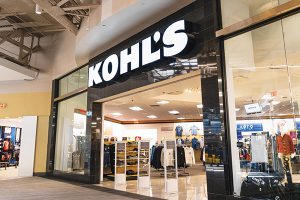The six-month long saga over the fate of Kohl’s Corp is heading towards a conclusion.
The department-store chain has entered into a three-week exclusivity period with Franchise Group Inc on a potential $60 per share cash offer, valuing the retailer at about $8 billion, the two companies said.
Kohl’s shares rose as much as 11% before closing up 8%. But investors shouldn’t get carried away just yet.
For a start, the $60 per share proposal is no knockout. It’s below the price levels mooted earlier in the process, which ranged from the mid to high-$60s.
Of course, the world has changed since the retailer first revealed takeover interest in January — and even since last month, when Kohl’s cut its sales and profit outlook. That was hardly the way to encourage a heated auction.
The $60 proposal represents a 26% premium to the share price, before activist Macellum Advisors urged the company to alter its board or explore a sale. Using the closing price, the premium is about 42%.
Still, Kohl’s shares reached a 12-month high of $63.71 on Jan. 24. Getting up to this level would be more palatable to shareholders. The hurdle is that Franchise Group, with a market capitalisation of just $1.6 billion, is much smaller than the company it is trying to buy.
Franchise Group said on Monday that it intended to contribute approximately $1 billion of capital.
The majority of the funding would be debt backed by Kohl’s real estate, possibly through a deal to sell its property and lease it back. The department store had property and equipment on its balance sheet of $7.8 billion at April 30.
But this is a risky time to be funding a big, leveraged buyout, given concerns about the broader economy. Even if Franchise Group does secure the financing, it will be wary of overpaying. All these factors may make it hard to afford a sweetener.
Franchise Group has the advantage of having retail experience, through its brands including The Vitamin Shoppe and Pet Supplies Plus, although as the name suggests, its experience is in franchising.
And while Kohl’s is cash generative, with free cash flow of $1.6 billion in the year to January 29, a new owner would face a higher interest-rate environment.
The history of retailers that were taken private and loaded with debt is not
encouraging.
Rival Neiman Marcus’s borrowings, for example, became so overwhelming in the pandemic that it filed
for Chapter 11 bankruptcy in 2020.
—Bloomberg
 The Gulf Time Newspaper One of the finest business newspapers in the UAE brought to you by our professional writers and editors.
The Gulf Time Newspaper One of the finest business newspapers in the UAE brought to you by our professional writers and editors.
